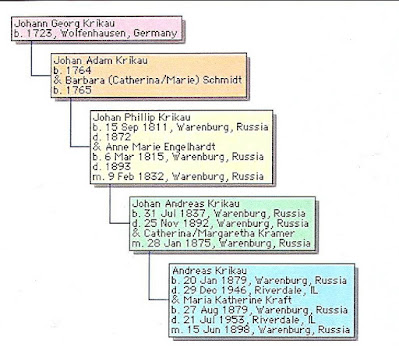52 Ancestors in 52 Weeks
Week 9
Prompt – Multiple
I find and use multiple sources for my
ancestors in my tree. However sometimes that can be more of an
hindrance than help. In the case of my maternal great grandmother, Maria Krikau, I
have found several sources that were listed on Ancestry.com. Ancestry often includes the image with the transcription of the
record. More than once I have to peruse the actual image to make out
what is actually written and not what was transcribed by another
person. Although it could be transcribed correctly but the recorder of the event
wrote down what he heard which does not translate to correct
information or spelling.
I have included partial transcriptions
from some of Maria Krikau's sources below.
Her name is Maria Katherine Krikau;
nee: Kraft. In the first 3 sources below she is transcribed as Maria
Krikan. I have blogged about this before and that is the written “u”
looks very much like a “n”. By 1916 she is going by Marie and
not the more formal Maria. The 1921 Canadian Census transcribes her
name as Mary Krikow and in the 1930 U.S. Census, she is Mary Krikaw. The Naturalization source seems to have the most accurate
information. In the sources like Find a Grave and in her obituary she
is listed as Maria Krikau Hartwig. It was not until I first laid
eyes on her obituary (60 years after the fact) that I knew she had
remarried after Andreas Krikau died.
Maria Krikau seems to have a
complicated nationality / race history. To be fair, they were
Germans living in Russia. Her nationality is listed as German,
Austrian, and Russian. Her race is Russian. In the two U.S. Census
her race is listed as “white”. Her “mother tongue” is listed
as Russian. This is an assumption one could make seeing how her
birth place is Russia. In fact her mother tongue would be German as
listed in the 1930 US census. As for speaking English, she could
speak English in the 1916 Census and couldn't speak English in the
1921 Census. In the 1930 Census she can speak English. Interestingly,
the 1940 US Census the question of ability to speak English is not
included.
The question of schooling is
interesting too. In the 1916 and 1921 Canadian Census and 1930 US
Census, she is able to read and write. I am sure that she could in
her German language. In the 1930 and 1940 Census it says she did not
attend school. But then the 1940 Census goes on to say that her highest grade
completed is Grade 8 in elementary school. How does that work?
Maria Krikau Hartwig's birth date is
somewhat inconsistent as well. In most of the sources it asks for a
estimate of birth year. It is listed as 1879 or 1880. Her
naturalization papers list her correct birth date as August 27, 1879.
It was not until this past week while working on sourcing Maria
Krikau's birth date that I noticed the discrepancy of her birth
dates. In both her obituary and Find a Grave her birth date is
listed as August 27, 1878 !
Canadian Passenger Lists, 1865-1935
Maria Krikan
Birth Year--------------1879
New York, Passenger Lists, 1820-1957
Maria Krikan
Birth Date----------------1879
Ethnicity/ Nationality----German
-
U.S., Border Crossings from Canada to U.S., 1825-1960 (1913)
Maria Krikan
1916 Canada Census of Manitoba, Saskatchewan, and
Alberta
Marie Krikan
- Birth Year---------------------------1880
-
Racial or Tribal Origin------------Russian
-
Nationality--------------------------Austrian
-
Can Speak English-----------------Yes
-
Can Speak French------------------No
-
Mother Tongue----------------------Russian
-
Can Read-----------------------------Yes
-
Can Write-----------------------------Yes
-
- 1921 Census of Canada
-
Mary Krikow
-
Racial or Tribal Origin------------------Russian
-
Nationality--------------------------------Russia
-
Birth Year---------------------------------1880
-
Birth Place--------------------------------North Russia
-
Can Speak English?----------------------No
-
Can Speak French?-----------------------No
-
Other Language---------------------------Russian
-
Can Read?---------------------------------Yes
-
Can Write?---------------------------------Yes
-
- 1930 United States Federal Census
-
- Mary Krikaw
-
Birth Year-------------------------------1880
-
Race-------------------------------------White
-
Birthplace-------------------------------Russia
-
Attended School-----------------------No
-
Able to Read and Write---------------Yes
-
Language Spoken----------------------German
-
Able to Speak English-----------------Yes
-
- 1940 United States Federal Census
- Mary Krikan
-
Estimated Birth Year------------------1880
-
Birthplace-------------------------------Russia
-
Race-------------------------------------White
-
Attended School or College----------No
-
Highest Grade Completed------------Elementary school, 8th grade
-
-
Illinois, Federal Naturalization Records,
1856-1991
-
- Maria Krikau
-
Birth Date---------------------------------27 Aug 1879
-
Birth Place-------------------------------Privalnoje, Russia
-
- U.S., Find A Grave Index, 1600s-Current
- Name--------------------------------Maria Krikau Hartwig
-
Birth Date---------------------------27 Aug 1878
-
Birth Place--------------------------Russia
-
Death Date--------------------------21 Jul 1953
-
-
Obituary of Maria Krikau Hartwig
Multiple sources are recommended for our ancestors in our trees. In the case of my great grandmother, Maria Krikau, that involves multiple interpretations of her events and the facts that lay within them.
Wendy











